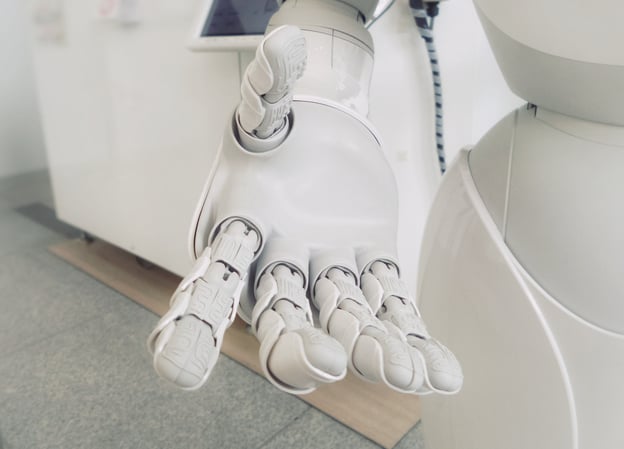If you're an e-commerce business owner, there's a good chance you've heard of artificial intelligence (AI).
You may have even considered using AI to help run your business. But what exactly is AI, and how can it help your e-commerce business?
Global corporate artificial intelligence (AI) investment from 2015 to 2021 has more than quadrupled from 12.75 to 93.5 Billion US dollars in 2021.
What's more, in 2023 it's predicted that the majority of businesses using AI for digital commerce should expect more than a 25% improvement in customer satisfaction, revenue or cost reduction. This indicates why AI is evolving so fast and that businesses believe in this technology.
But, What is it? In this article you will learn:
What is AI?
Examples of AI in E-commerce
5 Ways AI is transforming E-commerce
Improved customer service
Smarter inventory management
Trend predictions
AI Personalization
Fraud detection
Content creation
What is artificial intelligence?
Artificial intelligence (AI) is a branch of computer science that deals with creating intelligent agents, which are systems that reason, learn, and act autonomously.
In recent years, AI has made great strides in its ability to understand and interpret human language, recognize objects and faces, and make predictions based on data.
Technological progress has led to the development of many applications in eCommerce, such as chatbots that can provide customer support and recommendation engines that can personalize the shopping experience.
As AI continues to evolve, innovative and beneficial applications will likely be developed, transforming eCommerce in ways we cannot even imagine.
Think of AI as a helper, not a doer.

Photo by Possessed Photography on Unsplash
Examples of AI in E-commerce
According to several studies, not many eCommerce companies are using AI today. However, this number is expected to snowball over the next few years; 83% of companies say that AI is a top priority in their business plans.
The rapid adoption of AI is being driven by the increasing availability of AI services, the falling cost of AI-enabled hardware, and the growing recognition of the potential benefits of AI. As more eCommerce companies begin to harness the power of AI, we can expect to see even more transformative changes in the industry.
Some big eCommerce players using AI are Amazon, Alibaba, eBay.
How is Amazon using AI?
When you think of Amazon, you might think of its vast eCommerce empire. However, the company is also a significant player in artificial intelligence (AI). Amazon has been using AI to power its business for many years, showing no signs of slowing down. One way that Amazon is using AI is in its recommendation engine.
Amazon's AI engine uses customer data to provide personalized recommendations for products they might be interested in and to improve your search engine results.
Amazon AI personalizes by understanding the intention behind customer queries. Finally, Amazon is also using AI to streamline its logistics operation.
Amazon's AI logistics entity can predict customer demand using predictive algorithms and route products accordingly. As you can see, AI plays a significant role in Amazon's eCommerce business success. And with the company's deep pockets will likely continue to lead the way in this field.
How is Alibaba using AI?
Alibaba is the world's largest online and mobile commerce company, with over $485 billion in sales in 2018.
The company is using artificial intelligence (AI) in several ways to improve its platform and services.
For example, Alibaba's retail platform, Taobao, uses AI to personalize marketing recommendations for each individual user. The company's logistics arm, Cainiao, uses AI to improve package sorting and delivery times. Alibaba reduced logistics errors by 40% with AI.
In addition, Alibaba is using AI to help fight counterfeiting and fraud on its platform. Using AI to analyze images and text, Alibaba can quickly identify and remove fake or illegal products from its marketplace. Alibaba's use of AI is helping the company to remain a leader in the e-commerce space.
How is eBay using AI?
eBay is the most popular secondhand online marketplace, with millions of users worldwide.
eBay uses artificial intelligence (AI) to improve the user experience and make it easier for buyers and sellers to connect. AI is being used to personalize the eBay website for each user based on their individual interests and browsing history.
Users will see more relevant results when they search for items on the site. eBay is also using AI to help users find products that are similar to ones they have previously viewed.
By using machine learning, the site can identify patterns in user behavior and suggest items that may be of interest. By employing AI, eBay makes it easier for users to find the products they want, leading to a more efficient and enjoyable shopping experience.
5 Ways AI is transforming E-commerce
AI is opening up new possibilities for personalization, automation, and even predictive analytics. As a result, businesses that embrace AI are seeing increased sales, higher customer satisfaction rates, and improved efficiency.
Here are just a few ways that AI is transforming e-commerce:
🙍 Improved Customer Service
One of the most important—and visible—ways AI is transforming e-commerce is through improved customer service.
Thanks to chatbot platforms such as the one by Giosg, businesses can now provide 24/7 customer support at a fraction of the cost of traditional customer service teams.
And because chatbots never get tired or need a break, they can provide a level of service that human beings can't match.
A great example of how AI is improving customer service and sales is the Giosg live chat.
What's important to note is that chat isn’t just a support channel. With over 30+ targeting rules and intelligent routing of the customers makes, Giosg is effective in managing your resources and improving your productivity while lowering costs.

📦 Smarter Inventory Management
Another area where AI has a significant impact is inventory management.
AI collects data from past sales, weather patterns, and social media trends, and with that information, businesses can forecast future demand with unprecedented accuracy.
Having AI allows businesses to stock the right products at the right time, reducing inventory costs and leading to happier customers who can find the products they want when they want them.
🛍️ Seasonality predictions such as Black Friday
AI is an incredible tool for retailers during the busy holiday season.
The ability to forecast inventory and recommend items that require immediate replenishment could help cut waste in your eCommerce stores.
Also, you increase sales because shoppers can pick what they need when they need it instead of joining a waiting list. (This brings a lot of purchaser friction, and sales will drop)
Also, AI can make personalized black Friday recommendations based on data sets or preferences you've flagged in previous searches—saving time while improving customer experience!
💎 AI Personalization
One of the most powerful ways AI is transforming e-commerce is through personalization.
Businesses can now use AI to personalize customers' shopping experiences by collecting data on customers' past behaviour.
From recommending products they're likely interested in, to showing customers personalized deals and offers, AI is making it easier for businesses to give their customers exactly what they want and market them the right services using the right AI tools.
🕵️ Fraud Detection
Another critical way AI is transforming e-commerce is through fraud detection.
For example, businesses can now identify fraudulent activity with uncanny accuracy by analyzing data points like IP addresses, email addresses, and credit card numbers. All this is done by a computer configured to do this detection work.
AI protects businesses from loss and helps build trust with customers by showing them that their information is safe.
🎨 Content Creation
AI is also transforming e-commerce by helping businesses create better content.
As every e-commerce business knows, content is king. From product descriptions to accompanying photos, the right content can make all the difference in whether or not a customer decides to purchase.
However, creating high-quality copy can be time-consuming and expensive. That's where AI comes in.
Using machine learning algorithms, AI can help businesses make better content faster and at a lower cost. For example, AI can help to identify which product photos are most likely to convert or write product descriptions optimized for search engines.
As a result, AI is making it easier than ever for businesses to create content that sells.
Whether identifying which product photos are most likely to convert or writing product descriptions optimized for search engines, AI is making it easier than ever for businesses to create content that sells.
Wrapping Up
As you can see, AI is having a significant impact on e-commerce businesses of all sizes.
If you're not already using AI to help run your business, now is the time to start. With giosg, you can integrate most of these features and is constantly evolving to incorporate more AI features into the platform.
Implementing even just one of these ideas could significantly impact your bottom line.
Ready to get started? Book a demo and let us show you how we can help transform your business with artificial intelligence!
About the author
Marcos is A Project Management Consultant for Telecoms and Technology companies with several certifications and 7+ Years of experience. He enjoys blogging about online presence and Disrupting Technology such as AI.